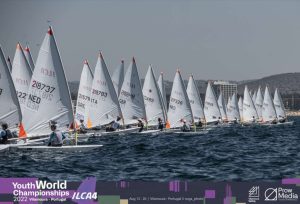Charles Byford – ILCA 4 Youth Worlds Vilamoura Portugal, 14-21 August 2022

Recently I was fortunate enough to attend the ILCA 4 Youth Worlds in Vilamoura, Portugal.
It was the largest event ever for the ILCA 4 class, which consisted of 426 boats (272 boys and 154 girls). The Australian team consisted of 16 sailors and 2 coaches. We arrived a week early to get used to the venue and compete in the Worlds pre-regatta, a three day warm up event, so we get used to big fleet starts which we are not accustomed to in Australia.
It became apparent that this would most likely be a light-wind regatta and that the first 100 metres could win or lose you the race and it was essential to pick a side of the course and stick to it as there was little wind in the centre of the course.
By the time the actual Worlds event started, I had a good understanding of the venue and the nature of the winds that would be experienced either gradient or thermal winds. The thermal wind would come in late from 2pm onwards when the ambient temperature hot 35 degrees, so there was a decent chance that most days we would be held ashore sweltering in the boat park awaiting the D flag to be raised and for everyone to hit the water fleet by fleet.
During the break between training sessions, the pre-worlds regatta and the worlds the team spent a lot of time together, whether it be going out for dinners or exploring Portugal. Everyone got to know each other, and we developed many great friendships.
On the first Day of the Worlds, it was windy and there was a sea breeze that continued to build as the day went on reaching up to mid-twenties. The wind in combination with current made the swell kick up greatly as the racecourse was offshore in the North Atlantic Ocean. That day I struggled committing to a side and gaining clear air off the start which I knew I’d need to nail in future days of racing.
The Second day the conditions were slightly lighter than the previous day. I unfortunately got caught in a lot of stack ups around the top mark caused by boats underlaying and tacking on the mark to try and round – I often picked the lay well, however lost 10-20 places due to this, it’s a situation that was hard to avoid and in turn I had a couple of below average races.
Day three, the final day of qualifying, it looked to be an onshore day with a chance of a light sea breeze coming through, which resulted in a shifty course and a lot of APs. My fleet was the last of the three to start and we endured six starting attempts under a combination of U and Black Flags, many generals with about a quarter of the fleet blown from the race. They attempted another race but was unfortunately abandon due to the land breeze coming back where we had waited until about 5pm for the last race. The conditions in the last race were somewhat resemblant of Pittwater.
Day 4, the first day of medal races – there was no racing until 3pm, we were held onshore then finally hit the water and with a fickle 3-5 knots the RO attempted a start in a dying breeze (and in desperation to get a race away), I got a reasonable start and halfway up the first beat the race was abandoned.
Day 5, there were three races run that day in a light to moderate sea breeze. That day was about winning the start at the boat or pin end and being first out to the corners, the left-hand side was favoured with a huge left shift paying dividends for those that chose the left hand lay. The further you sailed upwind the shift provided more leverage and huge gains. That day I learnt how to progress to start on the front row of the pack on the start and defending your position after leading out.
Day 6, being the final day of medal racing, there was again no racing the breeze let us down! I was Postponed ashore which was disappointing, the race committee did try to get gold fleet away, however failed as the breeze was too light. All racing for the day was abandoned at around 4pm.
Overall, this regatta has taught me many things about racing strategy and how to sail well in big fleets, most boats are evenly paced, so to get the edge it’s about pushing the limits in working the boat both upwind and working it downwind catching every wave and nailing transitions. I believe the biggest takeaways were sailing in big fleets you need a strategy for each section of the course and stick to it and secondly how paramount a good start is in both pulling the trigger at the gun and start line judgement i.e. distance from the line. A bad starts puts you in the trenches for the remainder of the race which is tough to dig your way out of in a larger fleet.
I thoroughly enjoyed the experience and would love to partake in the worlds again in 2023 and improve managing sailing in big fleets by winning more starts and ensuring I can be in the lead pack of boats and not playing catch up the whole race all from an average start.
Read more here:

